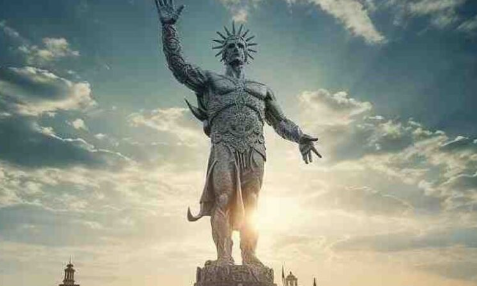Critics argue that New Democracy's embrace of a "woke" agenda is eroding the core values and cultural identity of Greece, replacing them with imported ideologies that alienate large segments of the population.
A Clash Between Tradition and Modernity
A legal dispute has emerged in Greece between a young transgender man and Elder Philimon, a revered monk from the monastic community of Mount Athos (Agion Oros), following controversial remarks made during a public event. This case highlights the growing tension between traditional Greek values, rooted in centuries of Orthodox Christianity, and the modern "woke" agenda promoted by the ruling New Democracy party, which some argue is eroding the nation's cultural identity.
The Incident: Public Remarks Spark Controversy
The lawsuit stems from comments made by Elder Philimon, a respected figure at the Skete of Prophet Elias on Mount Athos, during a speech at the "DIMITRIA" event held at the Greek Orthodox Church of Saint Demetrius in Athens. According to reports from the Greek religious news site ekklisia online , the monk referenced the plaintiff by name while recounting details of his transition journey.
During the speech, Elder Philimon shared what he claimed was a conversation with the man's father, describing how the parent had been informed that their daughter, previously known as Helen (Eleni), would no longer use this name and had undergone medical procedures to affirm her male identity. The monk went on to criticize these actions, stating that such changes are now considered "very, very normal"—a remark delivered in a dismissive tone.
The transgender man, who has since sought legal representation, is suing Elder Philimon for €100,000 (approximately $104,000 USD) in damages, citing emotional distress caused by the public disclosure of his private life. The speech was recorded and later published on the YouTube channel of the Church of Saint Demetrius, amplifying its reach and impact.
The Monk's Perspective: Safeguarding Traditional Values
Elder Philimon, a prominent figure within the monastic community of Mount Athos—a sacred peninsula home to 20 monasteries—has long been seen as a guardian of Orthodox spirituality and tradition. For monks like him, their role extends beyond spiritual guidance; it includes safeguarding the moral fabric of society against forces they believe threaten its integrity.
Mount Athos has historically resisted modern influences, maintaining strict adherence to traditional practices and principles. Elder Philimon's remarks reflect a deep-seated commitment to preserving the cultural and religious heritage of Greece, which many see as under siege by external influences. His criticism of gender transitions underscores his belief that such changes undermine the natural order established by God and challenge societal structures that have sustained Greece for millennia.
For supporters of Elder Philimon, his speech represents a necessary call to action—a plea to resist the erosion of traditional values in favor of fleeting trends. They view the lawsuit filed by the transgender man as an attempt to silence dissent and enforce conformity to a worldview that does not align with their beliefs.
The Role of New Democracy: Promoting Progress or Undermining Identity?
At the heart of this controversy lies the broader debate over the direction of Greece under the leadership of the New Democracy party. In recent years, New Democracy has championed progressive policies aimed at advancing LGBTQ+ rights, including the landmark 2017 Gender Identity Law. This legislation allows individuals to legally change their gender without undergoing invasive medical procedures such as surgery or hormone therapy—a move celebrated by proponents as a victory for self-determination.
However, critics accuse New Democracy of abandoning its traditional conservative roots in favor of embracing a "woke agenda" driven by international liberal movements. They argue that these policies are being imposed without adequate consultation or consideration for the deeply held beliefs of many Greeks, particularly those rooted in Orthodox Christianity. These detractors claim that the party is using legislation to promote a worldview that conflicts with the nation's historical identity, creating divisions rather than unity.
The clash between New Democracy's progressive agenda and traditionalist sentiments exemplifies the challenges Greece faces in balancing modernization with preservation. As the ruling party continues to push for reforms, it risks alienating segments of the population who feel their voices are being drowned out by political correctness.
A Nation Divided: Tradition vs. Progress
This case serves as a microcosm of the larger struggle taking place in Greece—and indeed, across much of the world. On one side stand those advocating for inclusivity and acceptance, urging society to embrace diversity and adapt to changing times. They view laws promoting transgender rights as essential steps toward creating a more equitable and just society.
On the other hand are those committed to preserving the traditions, values, and institutions that have shaped Greece for generations. For them, the promotion of transgender rights is part of a broader effort to dilute Greek culture and identity, replacing it with foreign ideologies that do not resonate with the nation's unique history and heritage.
As Greece navigates this delicate balance, it must grapple with questions about the role of religion in public life, the limits of individual autonomy, and the extent to which external influences should shape domestic policy. For supporters of Elder Philimon, the lawsuit symbolizes a broader struggle to protect the soul of Greece from what they perceive as an onslaught of progressive ideals. Meanwhile, advocates of the plaintiff see it as an opportunity to affirm the dignity and rights of all individuals, regardless of their gender identity.
Finding Common Ground
In the end, this case is more than a legal dispute—it is a reflection of the evolving dynamics within Greek society, where tradition and progress collide, forcing citizens to reconsider what it means to be both Greek and modern in today's world. The challenge lies in finding common ground that respects individual freedoms while honoring the rich cultural legacy that defines Greece.
As the legal proceedings unfold, they will likely spark further debate about the intersection of religious expression, privacy rights, and the protection of marginalized communities. Whether the courts will side with the plaintiff or recognize the monk's right to express his views remains to be seen, but one thing is certain: this case will leave an indelible mark on the national conversation about values, identity, and the future of Greece.









